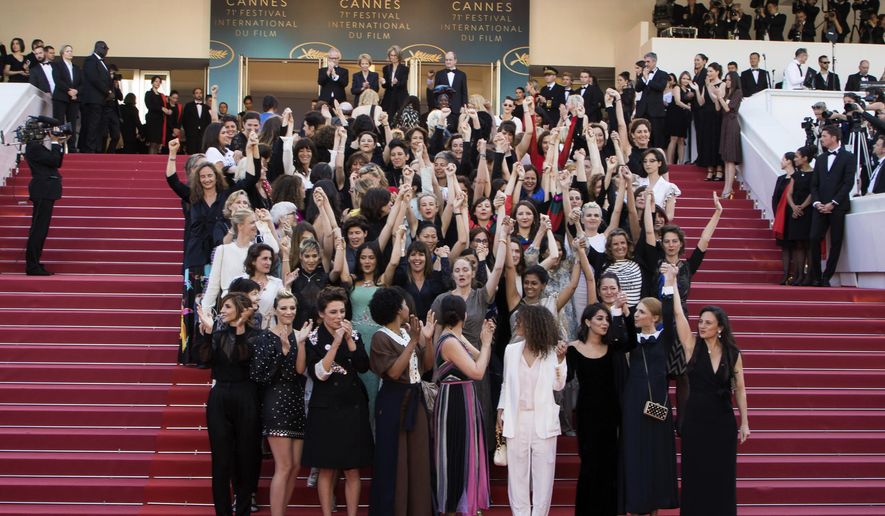For Hollywood liberals, outrage over sexual abuse allegations apparently hinges as much on who is being accused as on who is doing the accusing: Women must be believed — unless they are accusing a Democrat.
Celebrities rose en masse to savage Supreme Court Justice Brett M. Kavanaugh during his confirmation hearing, even risking arrest to express their indignation over the sexual assault accusations against him.
But those same stars, including George Takei, Patton Oswalt, Debra Messing, Alyssa Milano and Sarah Silverman, haven’t said much, if anything, about abuse charges against Rep. Keith Ellison, former Sen. Al Franken and President Bill Clinton, all Democrats.
The double standard isn’t lost on cultural observers, some of whom worry the imbalance could hurt the #MeToo cause.
Phyllis Chesler, author of the new book “A Politically Incorrect Feminist,” says Hollywood’s biased treatment of sex abuse accusations matters.
“Their refusal to call out Bill Clinton or before him, Ted Kennedy, as they rushed to judgment in the case of Clarence Thomas and Brett Kavanaugh, weakens the considerable lip service that Democrats have given to this issue,” Ms. Chesler said, adding that it also damages the “considerable work that second-wave feminists have done to expose and abolish sexual harassment and sexual assault.”
Activist Tarana Burke started the #MeToo campaign in 2006, but the phrase caught fire afer movie producer Harvey Weinstein’s fall following a crush of sexual abuse allegations against him.
Dozens of men got caught in its fury, including journalists like Charlie Rose and Matt Lauer, as well as actor Kevin Spacey and director Brett Ratner.
Robert Weiss, an intimacy and relationships expert specializing in infidelity and addictions, says it’s only natural for a movement like #MeToo to gather ideological weight.
“Right now … everything is going to be politicized,” said Mr. Weiss, who blogs for Psychology Today and The Huffington Post, adding that it doesn’t diminish its power or how lives are being positively changed by the movement.
“The whole conversation is elevating the culture,” Mr. Weiss said.
That may be true, but a movement that should be making citizens more sympathetic to sexual abuse victims may be doing the opposite. A recent survey shared by The Economist shows Americans’ skepticism about sexual harassment charges has increased in the past year.
For example, the percentage of people who say men who sexually harassed female colleagues 20 years ago should retain their jobs jumped from 28 percent to 36 percent in roughly 12 months.
A surprisingly high 18 percent of Americans said false charges of sexual assault are more troubling than legitimate cases of sexual assault left unpunished. In November, that figure stood at 13 percent.
Writer Alice Salles says that Hollywood’s disparate treatment of alleged abusers already has damaged #MeToo’s clout.
“You can’t go through one day online without seeing celebrities, politicians and news personalities discussing the Kavanaugh allegations as facts,” Mrs. Salles wrote at The Mises Institute website, a group dedicated to the Austrian School of Economics.
“We’re going to see … way more actual cases of assault and abuse being ignored or played down,” Mrs. Salles told The Washington Times.
Mrs. Salles also cites Sen. Cory Booker, the New Jersey Democrat who admitted to groping a woman when he was 15, as another example of Hollywood hypocrisy. “X-Men: Dark Phoenix” director Simon Kinberg is slated to host a fundraiser for Mr. Booker this month.
Musician and activist Tessa Lena, says the #MeToo movement, like others before it, has been “politicized and to some degree hijacked,” a byproduct of what she calls an “unhealthy media environment.”
“When it comes to #MeToo, I distinguish between those coming from a place of personal trauma … and those who are just cashing in on the buzzwords,” Ms. Lena said.
She added that some of the famous voices being heard today are interested in increasing their “relevance” along with fighting for a cause.
“It takes great discipline and a strong sense of responsibility to maintain a nuanced approach and to admit to shortcomings in one’s ’own’ political camp,” she said. “And typically, embracing nuance results in a decreased income.”
Melinda Hall, assistant professor of philosophy at Stetson University in DeLand, Florida, says the charge that Hollywood actors are being inconsistent with their criticism is hard to prove.
“If Alyssa Milano critiques Bill Clinton or Al Franken, but another actor, like Lena Dunham, refuses to, does that mean that Hollywood in general has a problem with consistency?” Ms. Hall said. “Hollywood actors in general are calling out hypocrisy among right-leaning and conservative politicians who claim to support traditional family values and yet lead lives that depart quite sharply from those values.”
Mrs. Salles offers some sober advice for celebrities who want to empower #MeToo.
“If you’re going to talk about it, offer the same kind of criticism against people who follow your political views,” she said. “If they’re honest, they have to stop looking at it as a political movement to dethrone [President] Donald Trump.”




Please read our comment policy before commenting.